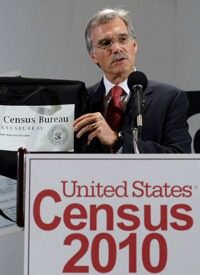
The federal stimulus program, intended to create jobs in the American economy, has largely been funneled into government jobs that do not create goods or services and — in fact — may hinder the private sector from growing (as government activity often does).
These jobs are overwhelmingly temporary jobs, and the people who get these temporary jobs are not given a natural step into a permanent, private-sector job. In some cases, notably census workers, the jobs were by their very nature temporary.
In some cases, because of the impact upon unemployment eligibility, census workers who had been on unemployment might have been better off not taking the census job at all, according to Andrew Stettner, deputy director of the National Employment Law Project. The Census Bureau did temporarily take about 700,000 off the unemployment rolls by hiring census workers over the last couple of years, but now that the work is completed, the unemployment rate will jump up again. The biggest impact should be in August, with some residual impact in September.? Many of the census workers facing longterm unemployment are middle-aged, with grim prospects of finding other employment in a very tight job market.
The much ballyhooed Keynesian “multiplier effect,” which proposes that for every new job created in the economy several other jobs in general support are also gained, appears not to have worked at all with the massive census hiring or, if it has worked, then the impact when the census jobs go will make the economic costs even greater by the multiplier effect loss of jobs. Although massive hiring of census workers provided a modest, temporary help for the unemployed, the long term consequences are nearly all bad.
Census workers who could have spent their time acquiring marketable job skills or getting an entry-level job in the private sector with the chance of advancement have lost that time in their working career. The heavy reliance of the Census Bureau on workers means that more efficient ways of conducting the census were deliberately suppressed. (This has been true of all the stimulus programs, which actively discourage time saving in work and judge “success” by the number of jobs created.)? The “help” the federal government said it was providing the American economy has been anything but that.
Photo: AP Images



